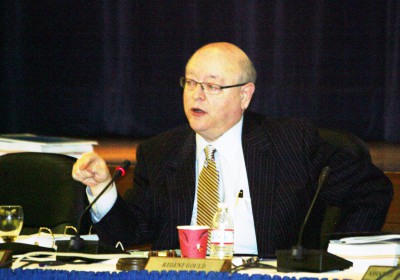Annalise Domenighini
Executive Managing Editor
Photo by Hannah Davey
Members of University of California Merced’s The Prodigy, UC Los Angeles’ The Daily Bruin, UC Berkeley’s The Daily Cal, UC Riverside’s The Highlander, UCSD’s The Guardian, UC Davis’s The Aggie, UC Irvine’s New University, UC Santa Cruz’s City on a Hill Press and UC Santa Barbara’s The Bottom Line participated in a conference call with UC President Mark Yudof today to ask questions about his opinions on issues facing the UC system.
The Prodigy, UC Merced: Since 1980, the percent of state budget spent on corrections and prison has significantly increased, while the portion allocated to higher education has dropped. Our question is, should we take a system-wide stance against these shifting priorities to prevent further budget cuts and tuition increases?
Yudof: Well, I’ve certainly taken that position. I’ve said many times to the governors, the legislators that it’s… a total embarrassment, an improper allocation of resources, that the expenditures on prisoners are a multiple now of what they are on higher education, that we now have whatever… half as much to spend per student than we did 10, 20 years ago, and the priorities are upside down. I see Prop 30 as perhaps, at least an opening salvo to try and change that, and try to get increasing appropriations for the university. As you know, we’re down virtually a billion dollars in the last four years, we’ll be down another $375 million if Proposition 30 doesn’t pass. We have a $22 billion-plus budget, and $2 billion, roughly, if it doesn’t pass, will come from the state of California. So this is a disgrace in my view, and a lack of commitment to the students, and I’m with you, I’ve said it publicly, I’ve said it over and over.
The Highlander, UC Riverside: If you were to meet a UC student on the street today, what would you say to the student about the significance of the upcoming election? In your opinion, how might possible outcomes of the election affect the student?” asked the representative from UC Riverside’s The Highlander.
Yudof: I would say to the student that this is critical. This has more of a direct relationship to your pocketbook than virtually anything that I can imagine… So I would say, look, it’s a little bit more on the sales tax, and the income tax, it’s not perfect…. And we have a big, big swing on this. We froze tuition, but no one paid for it, and that’s $125 million. And in addition to that, if it doesn’t pass, another $250 million in cuts. We have a $400 million swing. And $400 million is one hell of a lot of student tuition money, just take my word for it, do the math. So I would say, if we get this done, we can maintain the quality, maintain the faculty. I don’t promise no tuition increases, but I’m hoping we could keep them in the single digits, rather than what you’ve seen over the last five to 10 years. That’s what I would tell them.
The Daily Bruin, UC Los Angeles: I wanted to know what prompted you to approve the rebenching policy, which aims to equalize the amount of per-student state funding across campuses.
(The rebenching policy has been known at UC Santa Barbara as the UCOP tax, and The Bottom Line asked a similar question about the policy.)
Yudof: Campuses have always paid for the Office of the President, we’ve never been free. Under the old system, which I didn’t like, there was no transparency, none. We just took whatever we needed, and out of a variety of central pots, very unevenly, with uneven policy consequences, and life went on. So the rebenching policy was designed to say, we’re going to try to do this on a uniform, someone calls it a tax, that’s fine if you want to call it that, but it’s not new money, we always had the money. We’re just trying to do it in a more transparent, more fair way. And we left it up to the campuses to decide where the money came from. So the campuses actually, in general, have the discretion, to decide against what base to levy this tax to support these central activities. And by the way, this is also admission and financial aid as well, a lot of stuff in there that’s related to students. It’s a better system… we’re always happy to share with you what we spend that money on, and you could look at it, and critique it, the digital library that the campuses share together, it goes to campus research grants, it’s a lot of different things.
The Daily Cal, UC Berkeley: In light of Prop 30, what strategies does UC have or has it been discussing to keep UC schools an economical option for both in-state and out-of-state students?
Yudof: You know, we have the most generous financial aid system in the United States. … 30 percent of our tuition gets turned back into financial aid. In addition to that, we have Pell Grants and we have Cal Grants and so forth. The result is, half of our students pay no tuition. That’s pretty affordable. I don’t say it’s free, I mean, you have to have a roof over your head, you have to eat, you have to buy books, you have to travel, you have issues, but in this world, that’s pretty good. Our average debt is $20,000 a year, we’ve controlled it pretty well. That’s significantly below the national average, and I’m talking about only public universities, for private, it can be much, much higher. So I think we’ve done a good job, We’re committed to doing that, and if you actually look at our actual workload amount, that is what students are expected to pay, they’ve been relatively flat over the last three years, even as tuition, and even gone down even as tuition has risen.











